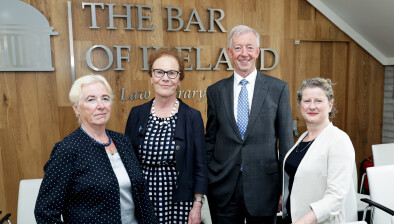Proposed constitutional changes risk introducing new ‘harmful stereotypes’

Sinéad Lucey
The wording of the government’s proposed constitutional amendments on family and care may remove “offensive” references to women but risk introducing new “harmful stereotypes” about disabled people, an influential legal rights group has warned.
FLAC has written to the Taoiseach, the equality minister and Oireachtas committees to outline concerns raised in its preliminary analysis of the referendum bills, which were announced last week and published today.
The charity has called for more information about the practical effects of the proposed family amendment, which it believes may have very significant implications for law and policy in a number of areas.
It has also said that the proposed new care provision is unlikely to be interpreted as imposing any enforceable obligation on the State to support care that is provided in the home or otherwise, and may also be incongruent with the rights of persons with disabilities.
FLAC has called for adequate time to be afforded to the consideration of the referendum bills by the Oireachtas and for engagement with civil society.
Sinéad Lucey, FLAC managing solicitor, said: “We very much welcome the proposals to remove the Constitution’s offensive ‘women in the home’ provision, and the fact that the family amendment, if enacted, would mean that the constitutional protection of the family would no longer be limited to families based on marriage.
“However, in engaging with the government in relation to the proposed referendums, FLAC has emphasised the need for clarity around what the amendments are seeking to achieve — so the best and most effective wordings can be put to the people, and so that the proposals can be understood by voters.
“There is an urgent need for clarity on what the practical implications of the ‘family’ amendment and how the government will give effect to it in legislation. The expanded definition of ‘family’ proposed is very significant and the government should articulate their view on its scope and practical implications.
“The government must also address the significant concerns which arise in relation to the proposed ‘care’ amendment – the wording of which differs significantly from that which was proposed by the by the Oireachtas committee on gender equality and diverges from the recommendations of the Citizens’ Assembly on Gender Equality.
“It is unlikely that the new Article 42B proposed will be interpreted as providing any new rights to parents of children with disabilities seeking supports for their child in terms of their care at home or in school, or for people with disabilities or older people seeking to live independent lives.
“Further, the addition of the proposed new Article 42B would create a situation where the only mention of people with disabilities in the Constitution is an implicit reference to them as the subject of family care. This may create a tension between the Constitution and the provisions of the UNCRPD (which is underpinned by the principle of autonomy for people with disabilities) and give constitutional expression to harmful stereotypes.”
The government has proposed that the two referendums should take place on 8 March, International Women’s Day, next year.









